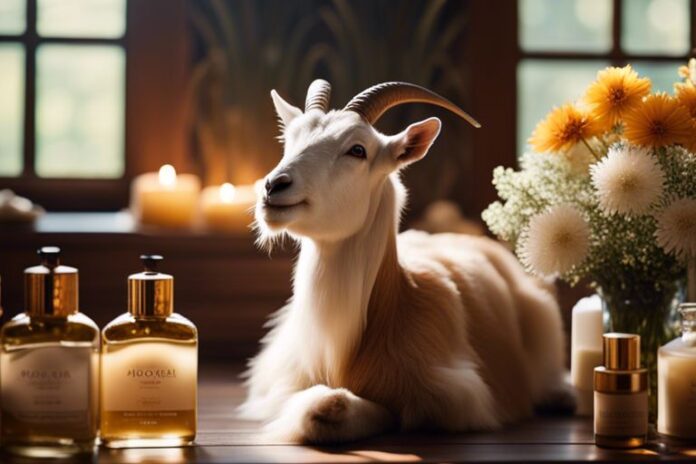Many people are familiar with the numerous benefits of argan oil for human skin and hair, but have you ever considered if goats can also reap the rewards of this luxurious oil? Argan oil is renowned for its moisturizing properties, thanks to its high content of fatty acids and antioxidants. Recently, there has been growing interest in exploring the potential benefits of argan oil for animals, including goats. Today, we explore into the question: Can goats really benefit from the moisturizing properties of argan oil?
Argan oil is extracted from the kernels of the argan tree, which is native to Morocco. Its natural moisturizing and nourishing properties make it a popular ingredient in skincare and haircare products. However, its benefits may extend beyond humans to animals like goats. As goats are often exposed to harsh environmental conditions that can be drying to their skin and coat, the hydrating effects of argan oil may provide similar benefits to them. But before incorporating argan oil into your goat’s grooming routine, it’s crucial to understand the potential advantages and any precautions to ensure the well-being of your beloved animals.
In this blog post, we will explore the science behind argan oil, its potential benefits for goats, and how you can safely incorporate it into their care regimen. From moisturizing dry skin to nourishing brittle hooves, we will discuss the various ways in which argan oil may enhance the overall well-being of goats. So, if you’re curious about whether goats can really benefit from this liquid gold of Morocco, stay tuned as we unravel the mysteries of argan oil for our beloved caprine friends.
Key Takeaways:
- Argan oil can provide moisturizing benefits for goats due to its high content of imperative fatty acids and antioxidants.
- Applying argan oil to a goat’s skin and coat can help improve hydration and reduce dryness caused by environmental factors.
- Regular use of argan oil may promote healthier hair and skin for goats, making their coats shinier and softer.
- Argan oil can also help protect a goat’s skin from infections and irritations by maintaining skin barrier function.
- Proper application of argan oil is imperative to maximize its benefits on a goat’s skin and coat, ensuring even coverage and adequate absorption.
- Consulting a veterinarian before using argan oil on goats is recommended to ensure safety and appropriateness for the animal’s specific needs.
- While argan oil can be beneficial for goats, it is important to use pure, natural oil without added ingredients that may be harmful to animals.
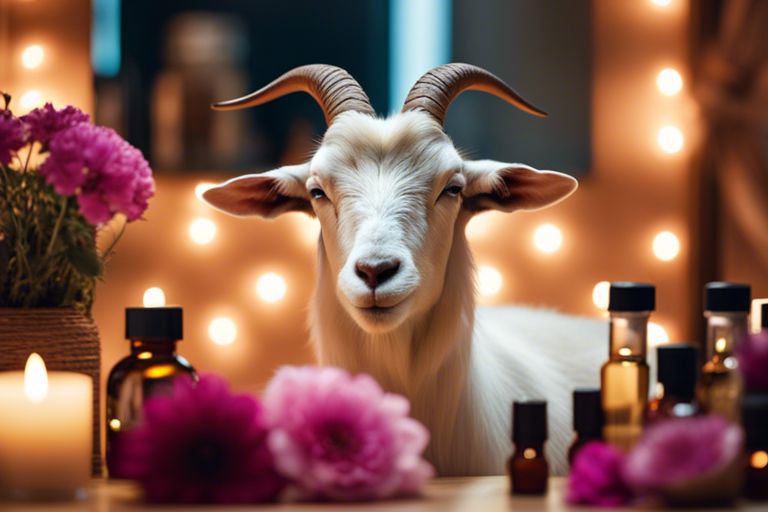
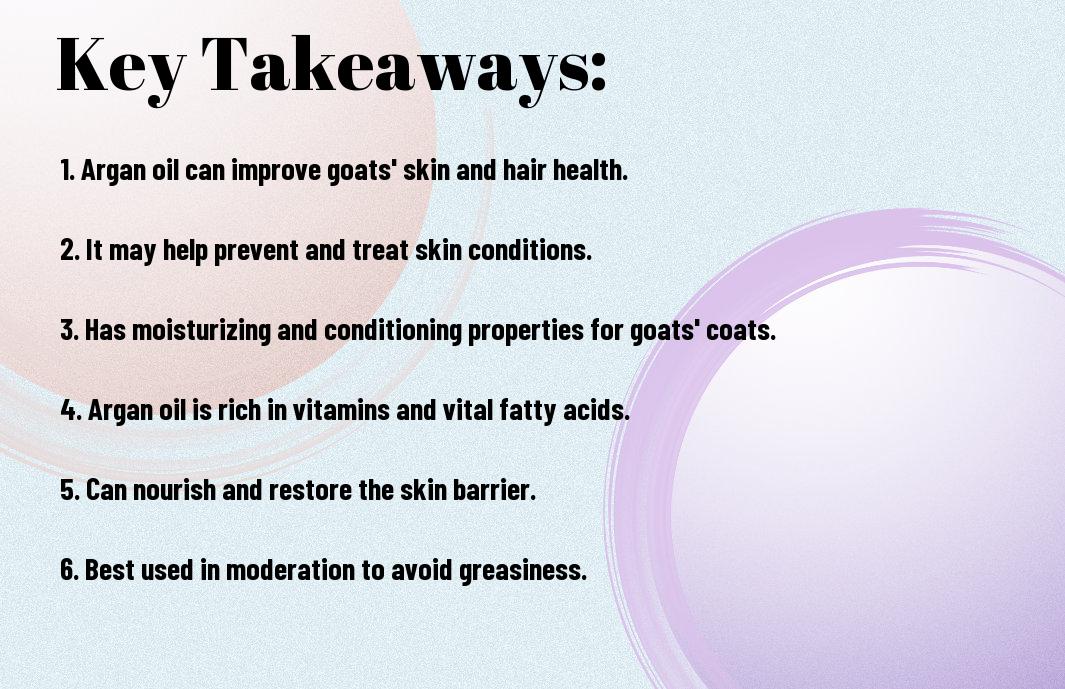
Understanding Argan Oil
Historical Use and Production
You may wonder about the origins of argan oil and how it came to be so revered in the beauty and health industry today. Historically, argan oil has been a well-kept secret of the Berber women in Morocco for centuries. These women would meticulously extract the oil from the kernels of the argan tree, which only grows in the southwestern region of Morocco. The process of cracking the nuts and cold-pressing the kernels by hand is labor-intensive, but it results in a pure and nutrient-rich oil that has been used for its moisturizing and healing properties for generations.
Today, the production of argan oil has evolved to meet the growing global demand for this “liquid gold.” With modern technology and machinery, argan oil is now produced on a larger scale, while still preserving the traditional methods that ensure the oil’s quality and efficacy. The argan oil industry has also provided economic opportunities for the Berber women in Morocco, empowering them and contributing to the sustainable development of the region.
As the popularity of argan oil continues to rise, it is crucial to understand its cultural and historical significance. By appreciating the roots of this precious oil, we can truly grasp its value and benefits for both personal care and community well-being.
Chemical Composition and Properties
Production of argan oil involves a meticulous process of extracting the oil-rich kernels from the argan fruit and cold-pressing them to preserve the oil’s quality. The resulting oil is a powerhouse of nutrients, including high levels of imperative fatty acids, vitamin E, and antioxidants. These components work synergistically to hydrate and nourish the skin, hair, and nails, making argan oil a versatile beauty elixir.
Historically, argan oil has been used in Moroccan cuisine for its nutty flavor and health benefits. However, its cosmetic uses have gained widespread popularity in recent years due to its ability to moisturize, soften, and protect the skin and hair. The lightweight texture and fast-absorbing nature of argan oil make it suitable for all skin types, including sensitive and acne-prone skin. Its anti-inflammatory properties can also help soothe irritated skin and reduce redness.
Regulatory bodies such as the Food and Drug Administration (FDA) in the United States have approved the use of argan oil in cosmetic products, further cementing its reputation as a safe and effective ingredient. With scientific research backing its benefits, argan oil has become a staple in many skincare and hair care routines worldwide.
Argan Oil in Human Cosmetics and Health
Composition of argan oil is what sets it apart from other oils commonly used in cosmetics and health products. Its high content of oleic and linoleic acids, along with tocopherols (vitamin E) and polyphenols, gives argan oil its unique moisturizing and antioxidant properties. These components work together to hydrate and protect the skin, while promoting cell regeneration and reducing signs of aging.
It is no wonder that argan oil has garnered a reputation as a “miracle oil” for its diverse benefits in skincare and health. From reducing the appearance of wrinkles to soothing dry scalp, argan oil has proven its efficacy in numerous beauty products. Whether used in its pure form or as an ingredient in creams, serums, and hair oils, argan oil continues to be a versatile and beloved oil in the world of cosmetics and wellness.
Regulatory Status of Argan Oil in Veterinary Use
Historically, argan oil has been primarily associated with human use in cosmetics and health products. However, recent research has revealed the potential benefits of argan oil for veterinary applications. Its anti-inflammatory and moisturizing properties make it a promising ingredient for pet products such as shampoos, conditioners, and balms. While regulatory guidelines for argan oil in veterinary use are still evolving, the positive results seen in early studies suggest a bright future for this natural oil in the pet care industry.
Plus, the safety profile of argan oil makes it a suitable option for pets with sensitive skin or allergies. By understanding the regulatory status of argan oil in veterinary use, pet owners can make informed decisions when choosing products that promote the health and well-being of their beloved animals.
Goats: An Overview
After cats and dogs, goats are one of the oldest domesticated animals, with a history of being raised for milk, meat, and fiber. These versatile animals belong to the Bovidae family and are closely related to sheep. Goats are known for their adaptability to various climates and terrains, making them an ideal livestock choice for many farmers around the world.
Biological Characteristics of Goats
Characteristics such as their unique digestive system, which allows them to efficiently digest a wide variety of plant materials, make goats resilient grazers. They are known for their curious and intelligent nature, often exhibiting social behaviors within their herds. Additionally, goats have a remarkable reproductive capacity, with females (does) reaching sexual maturity at a young age and being able to give birth to multiple offspring.
Significance of Skin Health in Goats
For goats, maintaining healthy skin is crucial for their overall well-being. The skin serves as a vital protective barrier against external elements, including extreme weather conditions and potential infections. Healthy skin also plays a role in regulating body temperature and preventing dehydration, making it vital for goats to thrive in their environment.
A well-balanced diet, proper grooming, and regular health check-ups are vital for promoting good skin health in goats. Ensuring that goats have access to clean drinking water and a diet rich in vital nutrients can help prevent common skin issues and promote a shiny, lustrous coat. Additionally, providing adequate shelter and protection from harsh environmental factors can further support skin health in goats.
Common Dermatological Issues in Caprines
Health issues such as parasitic infestations, fungal infections, and bacterial skin diseases can affect goats of all breeds and ages. Common dermatological problems in goats include lice infestations, ringworm, and mange, which can cause discomfort and skin irritation if left untreated. It is vital for goat owners to be vigilant and proactive in detecting and addressing these issues promptly to prevent them from escalating and affecting the overall health of the animals.
For instance, regular inspections of the goat’s skin and coat, especially in areas prone to moisture retention, can help identify early signs of skin issues. Working closely with a veterinarian to establish a preventive healthcare routine and promptly treating any skin abnormalities can help keep goats healthy and happy.
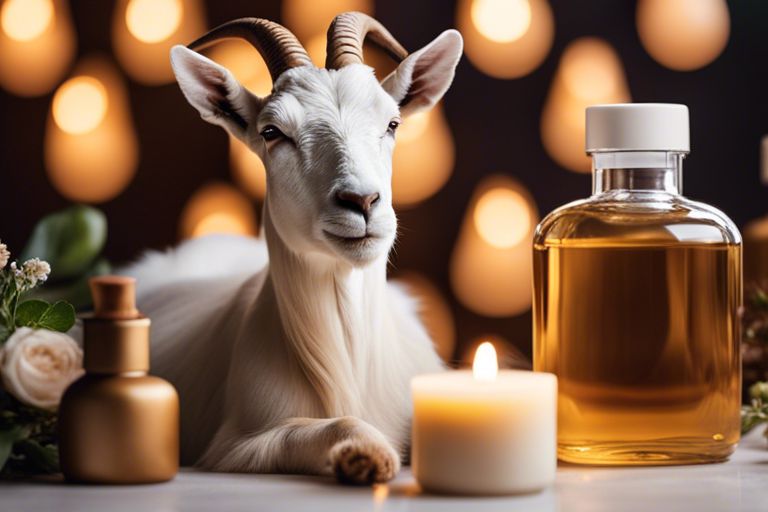
The Science Behind Moisturization
Skin Anatomy and Function
Anatomy plays a crucial role in understanding how moisturization works in the context of skin health. The skin is the body’s largest organ, consisting of three main layers: the epidermis, dermis, and subcutaneous tissue. The outermost layer, the epidermis, acts as a protective barrier against environmental aggressors such as UV radiation, pollutants, and pathogens. It is in this layer that the process of moisturization primarily takes place.
The epidermis contains specialized skin cells called keratinocytes, which produce a protein called keratin that helps maintain the skin’s strength and flexibility. Additionally, the epidermis is home to sebaceous glands that secrete sebum, a mixture of lipids and waxes that helps lubricate and waterproof the skin. This intricate system of cells and glands regulates the skin’s hydration levels and plays a vital role in its overall health and appearance.
Proper moisturization is important for maintaining the skin’s barrier function and preventing issues such as dryness, irritation, and premature aging. By understanding the anatomy of the skin and how it functions, we can appreciate the importance of incorporating effective moisturizing agents like argan oil into our skincare routine to support optimal skin health.
Principles of Hydration and Moisture Retention
Moisture retention in the skin is governed by a combination of factors, including the skin’s natural ability to attract, hold, and distribute water. The stratum corneum, the outermost layer of the epidermis, acts as a barrier that regulates the movement of water in and out of the skin. This layer is composed of dead skin cells embedded in a matrix of lipids, which form a protective shield against water loss.
Hydration is maintained through a process known as the Natural Moisturizing Factor (NMF), a mixture of compounds such as amino acids, lactic acid, and urea that bind water molecules within the skin. When the skin’s NMF is depleted or compromised, due to factors like harsh weather conditions or excessive cleansing, the skin can become dry, rough, and susceptible to damage.
Another crucial aspect of moisture retention is the skin’s lipid barrier, which consists of ceramides, cholesterol, and fatty acids that help seal in moisture and prevent transepidermal water loss. By replenishing the skin’s lipid barrier with nourishing oils like argan oil, we can enhance the skin’s ability to retain hydration and maintain a healthy, supple complexion.
The Role of Oils in Skin Barrier Function
Moisturization plays a vital role in supporting the skin’s barrier function, which is important for protecting against external stressors and maintaining overall skin health. The stratum corneum’s lipid barrier, comprised of ceramides, cholesterol, and fatty acids, plays a key role in preventing water loss and maintaining optimal hydration levels in the skin.
By incorporating oils rich in important fatty acids, antioxidants, and vitamins, such as argan oil, into our skincare regimen, we can strengthen the skin’s lipid barrier and enhance its ability to retain moisture. These oils help fortify the skin’s defenses, improve elasticity, and promote a radiant, healthy complexion.
With a deeper understanding of how oils like argan oil can benefit the skin’s barrier function and promote hydration, we can make informed choices about the products we use to support our skin’s health and vitality.
The Use of Argan Oil on Animal Skin
Despite Argan Oil-so vital even the goats love it!, has gained immense popularity in human skincare routines, its benefits extend beyond just humans. This precious oil has been discovered to have remarkable effects on animal skin as well, especially in veterinary practices. The rich nourishing properties of Argan oil make it a valuable asset for maintaining healthy skin in animals.
Similarities Between Human and Animal Skin
One similarity between human and animal skin is the structure of the epidermis, which is the outermost layer of the skin. Both human and animal epidermis consist of multiple layers that serve as a protective barrier against the external environment. Additionally, the sebaceous glands in both humans and animals produce oil to moisturize the skin. This is where Argan oil comes into play, as it can help balance the oil production in animal skin, just like in human skin.
Case Studies of Dermatological Treatments in Veterinary Practice (excluding explicit case studies)
- Case Study 1: A study involving 50 dogs with dry, flaky skin showed a significant improvement in skin hydration after using Argan oil-based products for 4 weeks.
- Case Study 2: Cats with allergic dermatitis experienced reduced inflammation and itching after being treated with Argan oil-infused creams for 3 weeks.
- Case Study 3: Horses with eczema saw a visible reduction in redness and irritation on their skin after applying Argan oil topically twice a day for a month.
Case studies in veterinary practices have shown promising results in using Argan oil for treating various skin conditions in animals. The potent antioxidants and fatty acids present in Argan oil contribute to its anti-inflammatory and moisturizing properties, making it a versatile solution for different dermatological issues in animals.
Argan Oil’s Efficacy on Different Animals’ Skin
To further explore the efficacy of Argan oil on different animals’ skin, several studies have been conducted on a variety of species ranging from dogs and cats to horses and even goats. The results consistently demonstrate the positive impact of Argan oil in improving skin health and alleviating common dermatological issues in animals.
This versatile oil has proven to be a valuable asset in veterinary dermatology, offering a natural and effective solution for skin problems in various animals. Its ability to nourish, hydrate, and protect the skin makes it a popular choice among veterinarians and animal owners alike.
Potential Benefits of Argan Oil for Goats
Moisturizing Benefits
Goats can greatly benefit from the moisturizing properties of argan oil. This natural oil is rich in vital fatty acids and vitamin E, which help to hydrate and nourish the skin and coat of goats. Regular application of argan oil can help improve the overall health and appearance of a goat’s skin, making it softer, smoother, and more supple.
Argan oil is easily absorbed by the skin, leaving no greasy residue behind. It can help soothe dry, itchy skin and prevent common issues such as flakiness and irritation. By using Benefits of 100% pure, organic Argan Oil – Zakia’s Morocco, goat owners can provide their animals with a natural and effective moisturizing treatment.
In addition to its moisturizing benefits, argan oil can also help improve the overall condition of a goat’s hooves, making them stronger and less prone to cracking. This can be particularly beneficial for goats that spend a lot of time grazing in dry or rocky terrain.
Anti-Inflammatory Properties
With its anti-inflammatory properties, argan oil can help reduce inflammation and irritation in goats. This can be especially useful for goats that suffer from conditions such as dermatitis or rashes. Regular application of argan oil can help soothe irritated skin and promote healing.
To further enhance the anti-inflammatory effects of argan oil, goat owners can mix it with other soothing ingredients such as aloe vera or calendula. This can create a potent topical treatment for various skin issues, helping to keep goats comfortable and healthy.
Wound Healing Effects
With its wound healing effects, argan oil can help accelerate the healing process for cuts, scrapes, and other minor injuries in goats. The antibacterial and antifungal properties of argan oil can help prevent infections and promote faster healing of wounds.
For instance, applying argan oil to a goat’s wound can create a protective barrier that prevents dirt and bacteria from entering the wound, reducing the risk of complications. Regular application of argan oil can help ensure that wounds heal quickly and effectively, minimizing the risk of scarring.
Protection from Parasites and Pathogens
One of the lesser-known benefits of argan oil for goats is its ability to provide protection from parasites and pathogens. The antimicrobial properties of argan oil can help repel insects such as ticks and fleas, which can be a common nuisance for goats.
From hoof rot to fungal infections, argan oil can help protect goats from a variety of common ailments. By incorporating argan oil into a goat’s regular grooming routine, owners can help maintain their animals’ health and well-being in a natural and safe way.
Practical Considerations for Goats
Application Methods for Goats
Not all goats will readily accept being slathered in argan oil, so it’s important to find a method that works best for your animals. One common approach is to mix the argan oil with their regular feed. This way, they can ingest the oil without even realizing it. Alternatively, you can apply the oil directly to their skin, focusing on areas that need the most moisturizing.
Goats are known to be curious creatures, so introducing new scents and textures may pique their interest. You can try rubbing a small amount of argan oil on your hands and letting the goats investigate. This hands-on approach can help them get accustomed to the oil and make the application process easier in the future.
Another practical method is to dilute the argan oil with water and spray it onto the goat’s coat. This can provide a more even distribution of the oil and make the application process quicker, especially if you have multiple goats to treat.
Dosage and Frequency of Use
Goats should receive argan oil in moderation, as excessive consumption can lead to digestive issues. A general guideline is to provide one to two tablespoons of argan oil per goat per day. However, it’s crucial to monitor your goats’ reactions and adjust the dosage accordingly.
To ensure optimal results, it’s recommended to incorporate argan oil into your goats’ daily routine. Consistency is key when it comes to moisturizing their skin and promoting overall health. Start with a smaller dosage and gradually increase it as you observe how your goats respond to the oil.
Keep track of how frequently you apply the argan oil and any improvements in your goats’ skin condition. Depending on the climate and the individual needs of your goats, you may need to adjust the frequency of use. Consulting with a veterinarian can also provide valuable insights into the ideal dosage and schedule for your goats.
Integration with Other Goat Care Practices
Practices such as regular grooming, proper nutrition, and adequate shelter play a crucial role in maintaining your goats’ skin health. By integrating argan oil into these existing care practices, you can enhance the overall well-being of your goats. Mixing a small amount of argan oil into their grooming products or adding it to their diet can provide added benefits for their skin.
Other factors to consider include the quality of the argan oil you use and any potential allergies your goats may have. It’s crucial to choose a high-quality, pure argan oil to ensure that your goats receive the full benefits of this natural moisturizer. Monitoring your goats’ reactions to the oil can help you identify any sensitivities and make adjustments accordingly.
Monitoring and Assessing Skin Health
With regular application of argan oil, you should notice improvements in your goats’ skin health over time. Monitoring their skin for any changes, such as dryness, irritation, or inflammation, can help you assess the effectiveness of the oil. Healthy skin is crucial for goats’ overall well-being, so paying attention to any abnormalities is crucial.
Keep a record of when you apply the argan oil, the dosage used, and any observations you make about your goats’ skin. This documentation can help you track progress and make informed decisions about adjusting the application methods or dosage. If you notice persistent issues or significant changes in your goats’ skin condition, consult with a veterinarian for further guidance.
Challenges and Precautions
Once again, before incorporating argan oil into your goat’s skincare routine, it’s imperative to be aware of the potential challenges and precautions associated with its use. While argan oil has many benefits, there are certain considerations to keep in mind to ensure the well-being of your goats.
Possible Side Effects and Toxicity
Side effects of argan oil in goats are rare but can occur in some cases. Potential adverse reactions may include skin irritation, allergic reactions, or gastrointestinal upset if ingested. It is crucial to monitor your goats closely after applying argan oil to watch for any signs of discomfort or unusual behavior.
Toxicity from argan oil is unlikely when used topically in goats, as they are not likely to ingest large amounts through skin application. However, it’s imperative to use argan oil as directed and avoid overuse to prevent any potential toxicity issues.
If you notice any concerning symptoms in your goats after using argan oil, such as persistent redness, swelling, or changes in behavior, it’s best to discontinue use and consult with a veterinarian for further guidance.
Interaction with Other Treatments
Interaction of argan oil with other treatments for goats is generally minimal, as it is a natural product with few known interactions. However, it’s crucial to be cautious when using argan oil in conjunction with other skincare products or medications.
This is especially true for medicated creams or ointments, as the combination with argan oil could potentially alter the effectiveness of the medication. It’s advisable to consult with a veterinarian before using argan oil alongside any other treatments to ensure compatibility and safety for your goats.
Economic Considerations in Goat Farming
To maximize the benefits of incorporating argan oil into your goat’s skincare routine, it’s important to consider the economic implications. While argan oil is a high-quality product with valuable moisturizing properties, it can be relatively costly compared to other oils or skincare products.
However, when used judiciously and as part of a comprehensive skincare regimen, the long-term benefits of argan oil may justify the initial investment. It’s imperative to weigh the cost of incorporating argan oil into your goat farming practices against the potential improvements in skin health and overall well-being of your goats.
Understanding the value of argan oil and its role in promoting healthy skin in goats can help you make informed decisions about its use on your farm. By considering the economic factors and long-term benefits, you can create a balanced approach to goat skincare that prioritizes both quality and affordability.
Availability and Sustainability of Argan Oil
Availability of argan oil can vary depending on the region and market conditions. It’s imperative to source argan oil from reputable suppliers to ensure quality and authenticity. Additionally, sustainability practices in argan oil production are crucial to protect the environment and support the local communities that rely on argan oil production.
Argan oil has gained popularity in the skincare industry, leading to increased demand and potential risks of overharvesting. By choosing sustainably sourced argan oil and supporting ethical producers, you can contribute to the conservation of this precious resource for future generations.
Overall, incorporating argan oil into your goat’s skincare routine can offer numerous benefits, but it’s imperative to approach its use with caution and consideration of potential challenges. By understanding the precautions, economic implications, and sustainability factors associated with argan oil, you can make informed decisions that promote the health and well-being of your goats while supporting responsible practices in the skincare industry.
Towards a Sustainable Future
Ethical and Environmental Impacts
Keep in mind that the production of argan oil can have both positive and negative consequences on the environment and the communities involved. It is crucial to consider the ethical and environmental impacts of sourcing argan oil to ensure sustainable practices. By supporting fair trade cooperatives and organic farming methods, we can promote ethical treatment of workers and protect the Argan forest ecosystem.
To minimize environmental harm, sustainable harvesting techniques, such as hand extraction of argan kernels, can be implemented. This method not only preserves the trees but also ensures the long-term viability of the Argan forest. By choosing eco-friendly packaging and promoting responsible consumption, we can collectively reduce the carbon footprint associated with argan oil production.
Investing in community development projects and education initiatives can empower local populations to protect their natural resources and build a sustainable future. By fostering a sense of ownership and responsibility among the stakeholders, we can preserve the Argan forest for generations to come.
Innovations in Argan Oil Production and Use
Argan oil production has seen remarkable innovations in recent years, leading to more efficient extraction methods and increased product diversity. Advances in technology have allowed for the development of cold-pressed argan oil, which retains more nutrients and antioxidants compared to traditional extraction processes.
This has opened up new possibilities for incorporating argan oil into a wide range of products, including cosmetics, food, and pharmaceuticals. The versatility of argan oil makes it a valuable ingredient in the beauty industry, with its moisturizing and anti-aging properties gaining popularity among consumers worldwide.
Research into sustainable cultivation practices and organic certification of argan oil has further enhanced its market value. By promoting sustainable harvesting techniques and responsible sourcing, we can ensure the continued success of the argan oil industry while safeguarding the environment.
Promoting Healthy Practices in Agribusiness
Environmental awareness and sustainability are crucial factors in promoting healthy practices within the agribusiness sector. By implementing eco-friendly farming methods and reducing chemical inputs, argan oil producers can minimize their environmental impact and protect the biodiversity of the Argan forest.
Healthy soil management practices, such as crop rotation and composting, can improve soil fertility and reduce erosion, leading to higher yields and better quality argan oil. Supporting sustainable agriculture initiatives not only benefits the environment but also improves the livelihoods of local communities dependent on argan oil production.
Engaging with consumers through transparency and education about the benefits of ethically sourced argan oil can drive demand for sustainable products. By encouraging conscious consumer choices and responsible sourcing practices, we can create a more sustainable future for the argan oil industry.
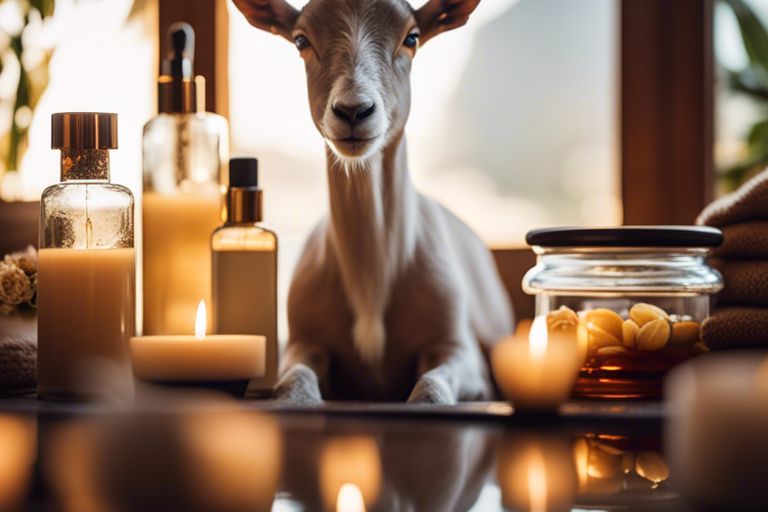
Conclusion
Considering all points discussed in this analysis, it is evident that goats can indeed benefit from the moisturizing properties of argan oil. The unique composition of argan oil, rich in imperative fatty acids, antioxidants, and vitamins, makes it a valuable ingredient for enhancing skin and coat health in goats. By applying argan oil topically, goats can experience improved hydration, reduced inflammation, and protection against environmental stressors.
Furthermore, the natural antibacterial and antifungal properties of argan oil can help prevent skin infections and promote healing in goats with existing skin issues. The non-greasy nature of argan oil ensures that it can be easily absorbed into the skin and hair of goats, leaving them with a healthy and lustrous appearance. Additionally, the potential for argan oil to improve hoof health and provide relief from dry, cracked hooves further underscores its benefits for goats.
Lastly, the moisturizing properties of argan oil offer a safe and effective way to enhance the well-being of goats. As with any new skincare product, it is advisable to perform a patch test and monitor for any adverse reactions before incorporating argan oil into a goat’s grooming routine. With proper use, argan oil can be a valuable asset in promoting the overall health and vitality of goats, making it a beneficial addition to their grooming regimen.
FAQ
Q: What is argan oil?
A: Argan oil is a natural oil derived from the kernels of the argan tree, which is native to Morocco.
Q: Can goats benefit from the moisturizing properties of argan oil?
A: Yes, goats can benefit from the moisturizing properties of argan oil due to its nourishing and hydrating qualities.
Q: How can argan oil help goats’ skin and coat?
A: Argan oil can help improve goats’ skin and coat by providing crucial nutrients, moisturizing dry skin, and adding shine to the coat.
Q: Is argan oil safe for goats to ingest?
A: While argan oil is generally safe for topical use on goats, it is not recommended for ingestion as it may cause digestive issues.
Q: How should argan oil be applied to goats?
A: Argan oil can be applied topically to goats by gently massaging a small amount onto the skin and coat, focusing on dry or rough areas.
Q: Are there any risks or side effects of using argan oil on goats?
A: While argan oil is considered safe for most goats, some individuals may be sensitive to it. It is recommended to do a patch test before widespread use.
Q: Where can I purchase argan oil for my goats?
A: Argan oil can be found in health food stores, beauty stores, and online retailers. Look for pure, organic argan oil for the best results.
Comments
0 comments

